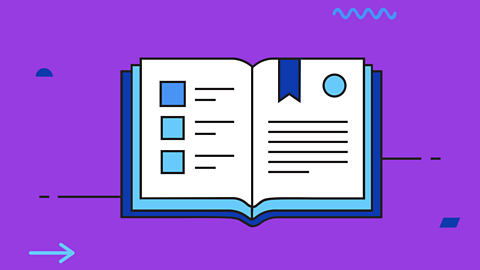Past papers and mark schemes
Here you can find past papers for OCR GCSE English Literature. Use the links below to download question papers and mark schemes. If you’re unsure whether you need Foundation or Higher papers, consult your teacher.
June 2023
Exploring modern and literary heritage texts - Higher tier - Past paper | Mark scheme
Exploring poetry and Shakespeare - Higher tier - Past paper | Mark scheme
June 2022
Modern prose or drama - Higher tier - Past paper | Mark scheme
19th century prose - Higher tier - Past paper | Mark scheme
Poetry across time - Higher tier - Past paper | Mark scheme
Shakespeare - Higher tier - Past paper | Mark scheme
These resources were created to support your exam preparation. The past papers and mark schemes here belong to OCR and are shared with their permission.
Practicing questions
This page provides tips to help you approach English literature exam questions effectively. You'll find advice on structuring your answers, identifying key themes and using evidence to support your points. These insights will help you develop the skills needed to tackle a variety of questions with clarity and confidence.
Use these tips to identify areas where you feel confident and those that may need more practice. Remember, the actual exam questions will only be revealed on the day of the exam, but the advice here will help you prepare for the types of questions you may encounter.
Top tips: Paper 1
Post-1914 (Section A)
Past paper trend: This question is about the modern prose or drama you have studied (Post-1914) and you will be asked to compare an extract from your studied text with an unseen extract provided in the exam.
Exam tip: Take the question step by step with these exam techniques.
1. Identify the correct question: Begin by locating the question that corresponds to the text you have studied. With several books or plays to choose from ensure you select the one you know well.
2. Understand the question structure: The question is divided into two parts:
Part A: Compare two extracts - one from the text you have studied and another unseen extract.
Part B: Answer a related question on your studied text, exploring how a theme, character, or idea is presented in the wider text.
You are advised to spend around 45 minutes completing both parts.
3. Answering Part A:
Focus on comparing the two extracts in relation to the given theme.
Use the bullet points in the question to structure your response, ensuring you address each one.
Before finishing review your answer to confirm that you have discussed both extracts.
4. Answering Part B:
Discuss how the theme is demonstrated elsewhere in the play or novel.
Incorporate your knowledge of the social, historical or cultural context of the text and explain its significance.
Make sure your context is relevant to the theme and specific question.
5. Preparation is key: To prepare for this type of question revise the following:
- themes
- characters
- plot events
- social and historical context
- key quotes
6. Using evidence in the exam: Aim to provide direct quotes, but if you can’t remember one exactly you can summarise or paraphrase instead. For example:
Full quote: “Is this the ring you wanted me to have?”
Paraphrased: 'The character asks if the ring she has received is the one her fiancé intended for her.'
7. Check your work: Both parts are marked for spelling, punctuation and grammar. Ensure your writing is clear, well-structured and technically accurate.
8. Key tips for success
Plan your response: Take a moment to organise your thoughts before writing.
Follow the bullet points: Use them as a guide to cover all required aspects.
Review your answers: Proofread for coherence, grammar and punctuation before moving on.
Nineteenth century prose (Section B)
Past paper trend: This part of the exam paper will look at a nineteenth century prose text that you have studied.
Exam tips:
1. Identify the correct question: Begin by locating the question that corresponds to the text you have studied. With multiple books to choose from ensure you focus on the one you know well.
2. Understand the structure of the question: You will answer one question on your studied 19th-century prose text. You will have a choice between:
An extract-based question with links to the whole text.
A broader question on a theme or character in the novel.
You should spend around 50 minutes on your chosen question (either an extract-based or a broader thematic question).
3. Answering an extract-based question:
Focus on analysing the extract in detail and linking it to the wider novel.
Use the bullet points provided in the question to guide your response. These will help you structure the answer and ensure you address all required elements.
Check your final response to confirm that you have fully analysed the extract and its connection to the whole novel.
4. Answering a thematic or character-based question::
Discuss how the theme appears elsewhere in the novel you have studied.
Incorporate your knowledge of the contextual factors relevant to your text, but stay focused on the specific question.
Address appropriate social, historical, cultural, or literary contexts as prompted. For example, consider the conventions of Gothic literature or science fiction if applicable.
Technical accuracy: This question includes up to four additional marks for spelling, punctuation, and grammar. Ensure your response is well-structured, makes sense and is punctuated correctly.
Key tips for success
Plan your response: Take time to organise your thoughts before writing.
Stay focused: Only include information that directly relates to the question and theme.
Proofread: Review your answer for clarity, coherence and technical precision before moving on.
Top tips: Paper 2
Comparing poems (Section A)
Past paper trend: In this part of the exam you will be asked to compare a poem you have studied with an unseen poem (one that is not in the anthology) and write about another poem from the anthology.
Part A: You will compare one poem from the anthology which you have studied with an unseen poem.
Part B: You will compare a poem from the anthology with an unseen poem and then analyse another poem from the anthology that is not provided in the exam.
Part A: Comparing two poems:
For Part A you will work with two published poems:
A poem which is part of the poetry anthology cluster you have studied (Love and Relationships, Conflict or Youth and Age).
An unseen poem provided in the exam.
Locate your correct question and anthology poem. To score well you must compare both poems thoroughly discussing their similarities and differences.
Part B: Writing about another anthology poem:
Part B focuses on a specific theme. You will need to choose a poem from your anthology cluster that relates to the theme. This poem will not be provided in the exam, so you must prepare by revising thoroughly. To do this:
Examine each poem in the section of the anthology cluster you have studied.
Identify evidence (quotes, techniques and themes) within each poem that could apply to various themes.
Know several poems well enough to reference and quote them accurately in your response.
Preparation tips:
Familiarise yourself with all the poems in your anthology cluster.
Practise identifying themes and analysing relevant evidence in each poem.
By preparing effectively you can confidently address both parts of this question.
Shakespeare (Section B)
Past paper trend: In Paper 2 Section B answer one question on the Shakespeare text that you have studied.
Exam tip: When answering the question focus on the play you have studied. You will have a choice between two questions. These questions usually have two parts:
Analysing the theme in the extract.
Exploring the same theme elsewhere in the play.
The first question will include an extract to guide your response. To answer this question effectively:
1. Plan your response: Begin by reading the extract carefully, identifying its connection to the question.
2. Annotate the extract: Highlight evidence that supports your points and add brief notes on what the evidence reveals. This will help you remember your ideas when writing the full response.
3. Broaden your scope: Ensure your response also considers the theme as it appears throughout the play. Note down initial ideas immediately after reading the question to capture key points for your essay.
4. Use the extract and accompanying quotes to showcase your understanding of the language: Explain the connotations of important words or phrases and how they relate to the theme.
The second question will focus on a theme or character without providing an extract. This type of question requires a strong knowledge of the play, including relevant quotes and examples. If you choose this question ensure you are well-prepared with a detailed knowledge of the text.
Remember: Both questions are marked for spelling, punctuation and grammar, with up to four extra marks for writing clearly and accurately. Always review your response to ensure it is well-structured, makes sense and is technically correct.
Example question - Shakespeare
Macbeth
Choose one question. You should spend about 45 minutes on this section.
EITHER
- How does Shakespeare present Lady Macbeth as a powerful woman? Refer to this extract from Act 1 Scene 5 and elsewhere in the play. [40]
The raven himself is hoarse
That croaks the fatal entrance of Duncan
Under my battlements. Come, you spirits
That tend on mortal thoughts, unsex me here,
And fill me from the crown to the toe top-full
Of direst cruelty! make thick my blood;
Stop up the access and passage to remorse,
That no compunctious visitings of nature
Shake my fell purpose, nor keep peace between
The effect and it! Come to my woman’s breasts,
And take my milk for gall, you murdering ministers,
Wherever in your sightless substances
You wait on nature’s mischief! Come, thick night,
And pall thee in the dunnest smoke of hell,
That my keen knife see not the wound it makes,
Nor heaven peep through the blanket of the dark,
To cry ‘Hold, hold!’
OR
- To what extent do Lady Macbeth’s soliloquies encourage the audience to pity her? Explore at least two moments from the play to support your ideas. [40]
Here are some tips to answer this section of the paper:
1. Select your question: Start by choosing the question that you want to answer. Here the first question has been chosen. The quotes provided can be used to demonstrate your understanding of the language and the social-historical context.
2. Break down the question: Analyse the question carefully to identify its focus. This will guide your reading of the extract.
3. Plan your response: List examples of how Lady Macbeth is portrayed as powerful throughout the play. Include references or quotes to support your points.
4. Examine the extract: Look closely for evidence that shows Lady Macbeth as a powerful character.
5. Annotate the extract: Highlight and annotate key parts of the extract with your ideas. These annotations will serve as the foundation for your plan.
6. Organise your ideas: Arrange your points in a logical order to build a coherent plan.
7. Develop an argument: Consider the sequence of your points. Can you form a clear argument for how Lady Macbeth is presented as powerful? Why might Shakespeare have chosen to present her as powerful - or perhaps not powerful?
8. Craft your opening sentence: Reframe the question in your introduction to set the tone for your argument. Incorporate your own interpretation supported by contextual evidence and examples from the text.
9. Follow your plan: Check off each point as you include it in your response to ensure you don't overlook any key ideas.
10. Review your essay: Once finished proofread your response to ensure clarity, logical flow and accuracy in spelling, punctuation and grammar. These aspects are part of the assessment criteria.
Revise English literature
Explore more English literature resources with the full range of help from Bitesize.
Revision podcasts - English literature
Supercharge your GCSE English literature revision by listening to these podcasts on set texts.

Support - exams and revision
Exams can be stressful, but don't worry: we've got you. Check out our handy tips and advice for keeping on top of your studies and revision.

OCR GCSE English Literature
Bitesize's full range of revision materials for English Literature, covering set texts, analysis and structure with playlists of revision videos.

Podcasts - Study support
Study smarter and take care of your wellbeing with two Bitesize experts.
